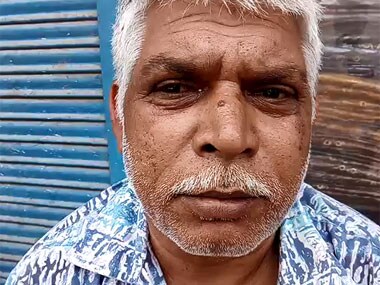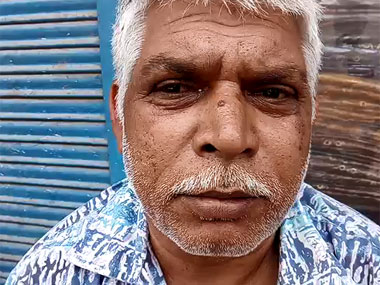New Delhi: Even as the BJP banks on the ‘Modi factor’ in the campaigns for the ongoing Lok Sabha polls, issues related to daily lives rule the roost in the Delhi slums. Many voters living in the slums in East Delhi say that rather than the glamour quotient of the candidates or the larger issues of the nation they are going to vote on the basis of their own issues. [caption id=“attachment_6557851” align=“alignleft” width=“380”]  A prospective voter at Sonia Gandhi Camp in East delhi. Kangkan Acharyya/Firstpost[/caption] The electoral contest in the capital city has gathered high momentum as the political parties have not only fielded heavyweights but also celebrities from the field of sports as candidates. In East Delhi, the BJP has fielded former cricketer Gautam Gambhir, Aam Admi Party has fielded Atishi Marlena and the Congress has fielded former Delhi minister Arvinder Singh Lovely as candidates. All the candidates are into a full-blown campaign across the constituency to woo voters. However, voters in the slums seem to be unmoved by the campaign as they prefer to remain focussed on their issues. In Sonia Gandhi Camp, one of the hutment clusters in East Delhi, many voters say that they have yet not decided whom to vote for. “We are going to hold a meeting among ourselves to discuss our issues and whom to vote for,” says Salma, a shopkeeper in the area. She also said that every election season the residents of Sonia Gandhi Camp decide in a meeting whom to vote. The meeting is likely to be held four days before 12 May when Delhi goes to poll. Even as the political parties indulge in mudslinging at each other in a bid to appear as a better option for the voters, many voters express indifference to this high pitch campaigns. “The election comes and goes but the national issues do not affect our lives. So what is the point in focussing on the issues which are not going to change our lives anyway?” asks Madhav Rao Pandey, the priest of the Mahabhairab temple in Sonia Gandhi Camp. “We get only 2.50 kilograms of rice per family member in fair price shops which hardly meets our demand. The remaining of the food grains are to be collected by us from open market at far higher rates. This is part of our daily struggle. The ‘chor’ and ‘chowkidar’ jibes hardly affect us and we are least bothered about it,” he said. Under the public distribution system, the families below poverty line are entitled to get 35 kilograms of food grains per month per family. It consists of 25 kilograms of wheat and 10 kilograms of rice at Rs 4.65 per kilogram for wheat and 6.15 per kilogram for rice. Madhav Rao Pandey’s family members being four in number get 2.5 kilograms of rice per head under this scheme. When reminded that the Congress is promising a sum of Rs 72, 000 to 20 percent poorest of the poor families under the Minimum Income Guarantee Scheme in its manifesto, he retorted with a question, “Weren’t we also promised of Rs 15 lakh per head in the last election?” He was clearly referring to the campaigning by Prime Minister Narendra Modi ahead of the 2014 Lok Sabha polls where he said that India has so much money stacked in Swiss banks and if elected his government would bring the money back and deposit Rs 15 lakh in everyone’s bank accounts. The East Delhi Lok Sabha constituency has 10 Assembly segments and nine of them were won by the AAP in 2015 Assembly polls. It seems that the performance of the MLAs in the last four years are also going to be determining factors in this election. Pandey said that the Delhi government has provided Sonia Gandhi Camp with 20 public toilets for men and women before which open defecation was a norm in the area. He said that the local AAP MLA Anil Bajpai has taken care that the people living in the Sonia Gandhi Camp get basic amenities such as toilets, water, roads and sewage disposal. But the performance of the AAP MLAs differs from one Assembly segment to the other. Some of the residents in Laxmi Nagar Assembly segment do not seem to be that happy with the AAP MLA Nitin Tyagi as say that they never saw him after he won the election. “He came during the election and after that, he never showed up in the constituency,” said Amarinder in Ramesh Park area. Soumveer, a Municipality Corporation of Delhi employee, who lives in Laxmi Nagar said that although the AAP government in Delhi has developed schools and hospitals, the price of commodities have gone up exorbitantly in recent times and it has become very difficult for them to survive with their present earning. “Earlier we used to earn and save a chunk of it, but now life has become has become very difficult for us as the prices of commodities right from cooking gas to food grains have gone up exorbitantly and no new earning source has opened up for us,” Soumveer said. When asked about the Minimum Income Guarantee Scheme or Nyuntam Aay Yojana (NYAY) promised in the Congress manifesto he said that nothing can be said about it unless the scheme is rolled out. “We have been promised many things earlier but not delivered yet. So let us wait and watch,” he said. Apart from the disillusionment of the present electioneering, there is also hope among some slum dwellers that things would change if Prime Minister Narendra Modi retains power. But interestingly the issues they want the prime minister to solve are directly related to their daily life or livelihood and hardly the ones which have gained importance in the campaigns. “I work in a security service agency. I am forced to work for Rs 12,000 a month whereas the company in which I am deployed pays Rs 25,000 to the agency. I think if Modi returns to power he would ensure that we get our due salaries,” says Alok Mishra, a resident of Pandav Nagar colony in Laxmi Nagar.
The East Delhi Lok Sabha constituency has 10 Assembly segments and nine of them were won by the AAP in 2015 Assembly polls.
Advertisement
End of Article


)
)
)
)
)
)
)
)
)



